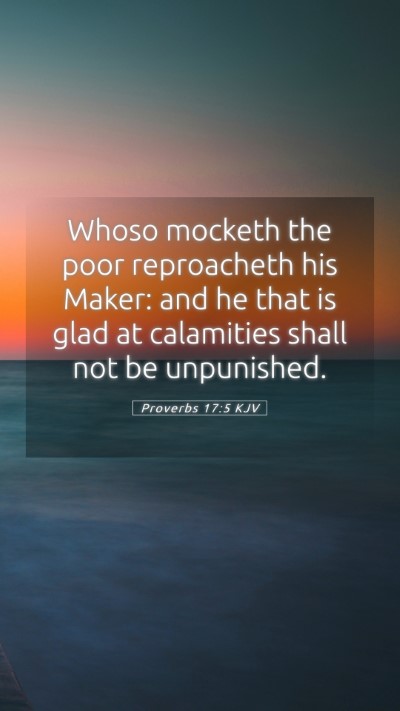Understanding Proverbs 17:5
Bible Verse: Proverbs 17:5 (NIV) - "Whoever mocks the poor shows contempt for their Maker; whoever gloats over disaster will not go unpunished."
Summary of Biblical Meaning
This verse serves as a profound reminder of the intrinsic value of every individual. Mocking or looking down upon those in need is not merely a social failing; it is an affront to God Himself, who created every person with dignity and worth. The second part of the verse expresses a moral truth about the consequences of delighting in others’ misfortunes. Such behavior is condemned, and the scripture warns that there are repercussions for those who revel in calamity.
Insights from Public Domain Commentaries
Matthew Henry's Commentary
Matthew Henry emphasizes the gravity of how we treat others, particularly the less fortunate. He notes that one who mocks the poor does so with a contempt that ultimately reflects one's relationship with God. Henry argues that this contempt indicates an imbalance in the heart and a severe misunderstanding of God's equity in creation.
Albert Barnes' Notes on the Bible
Albert Barnes interprets this verse as a warning against the arrogance that comes with social and economic superiority. He highlights that those who mock the poor fail to recognize their own dependency on God’s grace. Barnes further emphasizes the idea of accountability in our actions, suggesting that those who take pleasure in the suffering of others are inviting trouble upon themselves.
Adam Clarke's Commentary
Adam Clarke provides a contextual examination indicating that mocking the poor is not merely a social sin but a spiritual one. He elaborates on the principle that our treatment of the less fortunate is indicative of our spiritual state. Clarke notes that God's justice mandates consequences for those who show a lack of compassion and understanding toward others.
Key Themes for Bible Study
- Value of Humanity: The verse underscores the belief that every person, regardless of their social status, is valuable in the eyes of God.
- Divine Judgment: There is a strong theme concerning the inevitable judgment that awaits those who fail to show compassion.
- Moral Responsibility: It emphasizes personal accountability in how we interact with others, especially the vulnerable.
Application in Daily Life
Understanding this verse encourages believers to reflect on how they view and treat others in their daily lives. It challenges one to foster empathy and kindness, particularly towards those in less fortunate circumstances. Additionally, it directs us to consider the repercussions of our words and actions, fostering a conscious effort to uplift rather than demean.
Cross-References
- Proverbs 14:31: "Whoever oppresses a poor man insults his Maker, but he who is generous to the needy honors him."
- James 2:5: "Listen, my beloved brothers, has not God chosen those who are poor in the world to be rich in faith and heirs of the kingdom?"
- Matthew 25:40: "And the King will answer them, ‘Truly, I say to you, as you did it to one of the least of these my brothers, you did it to me.’"
- Luke 6:20-21: "Blessed are you who are poor, for yours is the kingdom of God. Blessed are you who hunger now, for you shall be satisfied."
Conclusion
Proverbs 17:5 serves as a compelling declaration regarding human dignity, divine justice, and moral responsibility. It challenges believers to embody compassion and humility, recognizing that how we treat the poor reflects our understanding of God’s character. This verse, and its insights from various commentaries, underscore the importance of engaging with scripture for both personal growth and community impact.


